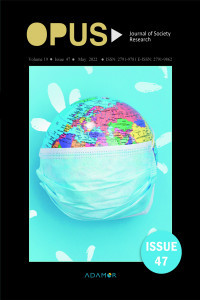Göç ve Demokrasinin Geleceği
Göç, Demokrasi, Yurttaşlık, Seçme ve Seçilme Hakkı, Çokkültürcülük
Migration and the Future of Democracy
Migration, Democracy, Citizenship, Suffrage, Multiculturalism,
___
- Bauböck, R. (2005). Expansive Citizenship—Voting Beyond Territory And Membership.Political Science and Politics, 38(4), 683–87.
- Breunig, C.,Cao, X nndLuedtke A.,(2012). Global Migration And Political Regimetype: A Democratic Disadvantage. British Journal of Political Science, Cambridge University Press. 42(4), 825-854.
- Byrne, J.(2018). National Identity And Migration In An Emerging Gateway Community, MDPI Social Science, 7(5), 73.
- Dahl, R.A., 1989. Democracy and İts Critics. New Haven: Yale University Press.
- De Genova ve Nicholas P. (2002). Migrant "Illegality" and Deportability In Everyday Life. Annual Review of Anthropology, 31, 419-47.
- Engdahl, M., Lindgren, K. O., & Rosenqvist, O. (2018). The role of local voting rights for foreign citizens : A catalyst for integration?, (Working Paper Series:2018:3), IFAU - Institute for Evaluation of Labour Market and Education Policy.
- Erdoğan, M. M. (2015). Avrupa’da Türkiye Kökenli Göçmenler Ve ‘Euro-Turks Barometre’ Araştırmaları. Göç Araştırmaları Dergisi, 1(1), 108-148.
- Estevens, J.(2018). Migration CRISIs in the EU: Developing a Framework For Analysis Of National Security And Defence Strategies. Comparative Migration Studies 6. Article Number 28.
- EUFRA (European Union Agency for Fundamental Rights). (2017). Together in the EU: Promoting the Participation of Migrants and their Descendants, Vienna.
- European Commission. (2004). Common Basic Principles for Immigrant Integration Policy in the EU.
- Forrester, A.C., Powell, B., Nowrasteh, A. ve Landgrave, M. (2019). Do Immigrants Import Terrorism? CATO Institute Working Paper.
- Fukuyama, F., (2006). Identity, Immigrationand Liberal Democracy, Journal of Democracy, 17(2), 5–19.
- Green, E.G.T., ve Staerklé, C. (2013). Migration and Multiculturalism. In Oxford Handbook of Political Psychology. UK: Oxford University Press.
- Hainmueller, J. ve Hopkins, D.J. (2014). Public Attitudes Toward Immigration. The Annual Review of Political Science, 17, 225-249.
- Huddleston, T., Bilgili, Ö., Joki, A. L. ve Vankova, Z., (2015). Migrant Integration Policy Index, 24.02.2018 tarihinde http://mipex.eu/political-participation adresinden erişilmiştir.
- Hyde, A., vd. (2013). Why Don’t They Naturalise? Voices from the Dominican Community, Latino Studies, 11(3), 313–40.
- Inci, E.I. (2017). Postmodern discourse analysis of citizenshiptests: the cases of the United States of America and the United Kingdom.Marmara Journal Of European Studies, 25(2), 103-130.
- Kılıç, S., Saharso, S. ve Sauer, B., (2008). Introduction: The veil: Debating citizenship, gender, and religious diversity. Social Politics, 15(4), 397–410.
- Koslowski, R. (2002). Challenges of international cooperation in a world of increasing dual nationalityin rights and duties of dual nationals evolution and prospects. New York: Kluwer Law International,
- Kymlicka, W. (2002). Multiculturalism and Minority Rights: West and East. Journal on Ethnopolitics and Minority Issues in Europe, Issue 4.
- Lizzeri, A.ve Persico, N. (2004). Why did the elites extend the suffrage? Democracy and the scope of government, with an application to Britain’s “age of reform”. The Quarterly Journal of Economics, 119( 2), 707–765.
- McLaren, L. M., (2010). Cause for concern? The Impact Of Immigration On Politicaltrust. Policy Network Paper, University of Nottingham.
- Medrzycki, K. (2017). Pioneering new immigration policy in the contemporary Japan. Göç Araştırmaları Dergisi, 3(1), 68-93.
- Miller, A. H. ve Listhaug, O. (1990). Political parties and confidence in government: a comparison of Norway, Sweden and the United States.British Journal of Political Science, 29(3), 357–386.
- Min, T.E.(2014). Thevimpact of panethnicity on Asian American and Latino political participation. Ethnicities, 14(5), 698-721.
- Parekh, B.C. (2000), Rethinking Multiculturalism: Cultural Diversity and Political Theory. Harvard University Press.
- Pedroza, L. (2015). The Democratic potential of enfranchising resident migrants, International Migration, 53(3), 23–24.
- Podobnik, B., Jusup, M., Kovac, D., ve Stanley, H.E. (2016). Predicting the Rise of EU Right-Wing Populism in Response to Unbalanced Immigration. Complexity, 2017, 1580526:1-1580526:12.
- Saurer, J. (2017). The acquisition of citizenship in the OECD Countries. IFO DICE Report 2 ,15.
- Schiller, N.G. ve Çağlar, A. (2013). Locating migrant pathways of economic emplacement: Thinking beyond the ethnic lens. Ethnicities, 13(4), 494–514.
- Tuna, M. ve Özbek, Ç.(2014). Uluslararası göçler sonrası kimlik tartışmaları ve alternatif iki model: Çok-kültürlülük ve Avrupa Birliği Yurttaşlığı, yurttaşlığı yeniden düşünmek: sosyolojik hukuki.Siyasal Tartışmalar içinde. İstanbul: Bilgi Üniversitesi Yayınları.
- United Nations (2017). Secretary-General Calls Migration Potential Solution To Many Global Challenges, Meetings Coverage and Press Releases. 16 February.
- United Nations (UN), (2016). International Migration 2015, department for economic and social affairs, Population Division.
- Vasile, O. ve Androniceanu, A. (2018). An Overview Of The Romanian Asylum Policies, Sustainability, 10 (5), 1461-1489.
- Verea, M. (2018). Anti-immigrantand anti-Mexican attitudes and policies during the first 18 months of the Trump administration sentimientos. Norteamérica, 13 (2).
- Wadsworth, J.,Dhingra, S., Ottaviano, G., ve Van Reenen, J. (2016). Brexit and the Impact Of Immigration on the UK, Center for Economic Performance. London School of Eonomics and Political Science.
- Weldon, S. A. (2006). the institutional context of tolerance for ethnic minorities: A Comparative, multi-level analysis of Western Europe. American Journal of Political Science, 50(2), 331–349.
- White, S., Nevitte, N., Blais, A., Gidengil, E., ve Fournier, P. (2008). The political resocialization of immigrants: Resistance or lifelong learning?. Political Research Quarterly, 61(2), 268–281.
- Wittenberg, L., (2017). Managing Mixed Migration: The Central Mediterranean Route To Europe, International Peace Institute Desperate Migration Series. No. 3, April.
- Yayın Aralığı: 6
- Başlangıç: 2011
- Yayıncı: ADAMOR Toplum Araştırmaları Merkezi
Kolektif Şiddet ve Kimlik Kaynaşmasına İlişkin Olarak Türkiye’de Futbol Şiddeti
Serbest Zaman Motivasyonu ve Serbest Zaman Tatmini: Açık Su Yüzme Yarışmaları Üzerine Bir Uygulama
Mustafa Can KOÇ, Harun AYAR, Hüseyin Gümüş, Kubilay ÇİMEN
Kalite Kontrol Grafiklerinde R Programlama Dilinin Kullanımı İle İlgili İçerik Analizi
1.Lig Goalball Oyuncularının Örgütsel Stres Davranışlarının İncelenmesi
Suzan DAL, Burçak KESKİN, Eray YURTSEVEN, Cemile Nihal YURTSEVEN
KOBİ’lerin Finansal Sorunlarına İşletme Sahiplerinin Bakış Açısı: Kars İli Örneği
Ceyda YERDELEN KAYGIN, Aytaç İKİNCİ
Algılanan Örgütsel Toksisitenin İş Doyumu Üzerine Etkisi: Duygusal Bağlılığın Aracılık Rolü
Kurumsal Politik Davranış: İşletme, Devlet ve Piyasa İlişkileri Ekseninde Eleştirel Bir İnceleme
Gelin Kaynana Çatışması Üzerine Sosyolojik Bir Analiz
Batman’da Sokakta Çalış(tırıl)an Çocuklar ve Karşı Karşıya Olduklari Riskler
